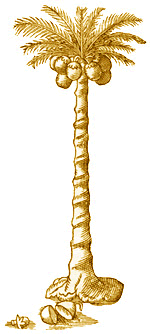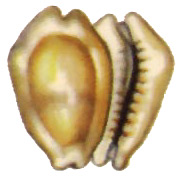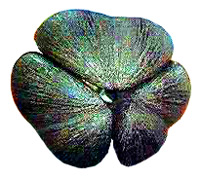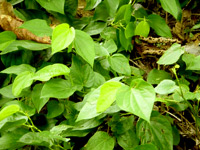|
Lazy toddy tapper wins
the ladies and saves feet from the chop
Originally told by Buraara Koi (also known
as Buraara Mohamed Fulu) in The Story of Bodu Thakurufaan
by Buraara Mohamed Fulu, transcribed by Al-Hajj Ibrahim ibn Ismail
Feeboa, published in the Maldives, Malé, by the Directorate of Instruction
(Mahkamah el-Irshad) 1958.
Introduction and translation of pp. 38-47 by Maldives
Culture editors with assistance from the editor of the
Official Website
of the Maldives Royal
Family.
 |
According to Buraara, six hundred years ago in Malé, two
young boys from Chittagong were aboard a ship anchored in the
harbour after a voyage across the Bay of Bengal.
Salih and Nasurath were allowed ashore
for a short visit, and they hid among the 'garden-quinine' plants in the Lonu
Ziyaaraiy Kolhu area until their ship left. Next day they met a childless middle-aged
man named Dhon Hassan who lived near a bushy part of Malé known as Valu Maizaan.
Dhon Hassan had the two boys circumcised in preparation for their education as
Muslims but he died suddenly, and when his house and land reverted to government
property, the boys found themselves homeless again.
By chance, they
came upon the Huvadhu atoll tax-collector as he unloaded his cargo under a tree
at the north beach. He offered them a roll of bon’di, a coconut sweet,
in return for guarding the cargo against the crows, but when time came for payment,
the man became reluctant and abusive before finally kicking a single bon’di
from a bundle towards the hungry boys. They rushed towards the food, and his foot
hit one of them.
The boys were appalled by this treatment and wanted
to leave Malé.
‘These days we have to submit to being kicked,
or spat on, or hit with something,’ they said as they chewed the bon’di.
‘Let us hope a time comes when, God willing, we won’t experience such
things.’
Their wish was granted when Salih and Nasurath were
adopted by the Malé treasurer. They learnt to perform his official duties
so competently they became indispensable to government. Salih passed away, leaving
Nasurath to become the queen’s new treasurer after the death of his guardian.
Treasurer Nasurath was crowned King Nasuraddheen when the old
queen died. Chosen for his outstanding intellect and wisdom,
the new king also proved to be a cruel and vengeful man who
amputated men’s hands for theft, and he had never forgotten
that insulting kick from the Huvadhu tax collector... |
Buraara Koi continues
the story:
 |
The king sent a letter to that tax collector
and when he opened the letter this is what he read:
'Hey tax collector, when you travel across Huvadhu channel heading
for Malé, collect all the live cowrie shells you can find without
leaving the ship, or I'll have your foot chopped off.'
The tax collector was most unhappy about the letter, and his sadness
spread through the atoll. His household had about 144 toddy men and
among them was a man called Three Palms Mohamed. Why did he have such
a name? Because each of the other toddy men could tend nearly 144
palms every day, and all he could manage was three! The whole atoll
knew this!
One day the toddy man walked into the kitchen, hung up his implements
and demanded food.
'Three Palms Mohamed, you only have your hunger to think about,' someone
said. 'The noble tax collector has received a letter from the king
in Malé. It has made him very unhappy, and his misery has spread throughout
the atoll.'
What was in the letter?' asked Mohamed, wondering what had made his
master so distressed.
'It said he must collect live cowrie shells straight from the sea
as his odi sails to Malé, or his foot will be cut off!'
'I can help with that problem,' announced Three Palms, 'if I get to
marry Dhon Kamana, the collector's daughter.'
He ate his food and left, and the people in the kitchen gossiped about
what had been said and the story spread from mouth to ear until it
reached the tax collector. He sent for the toddy man and told him
he was aware of his comments and wanted to know if he really knew
how to satisfy the king's command.
'Yes sir,' Mohamed assured him, 'if I am permitted to marry your daughter,
Dhon Kamana, then I can make it happen.'
Without hesitating, the tax collector gave permission for the marriage.
'Get the odi ready, sir, and set up a reciting hut at the beach
and pick the flowers. Let me know when everything is ready.'
When it was all done, Mohamed went to the new hut and offered flowers
to the ocean as he made his recitations. Then he found the tax collector
and woke him up.
'Tomorrow morning, sir, during the first hour of sunrise, leave for
Malé in the odi.'
Mohamed went off, and the tax collector sent for the crewmen and they
all recited travel prayers before sailing away just after daybreak.
From the moment they entered Huvadhu channel, cowrie shells began
crawling up the hull and into the boat. There were so many, the crew
had to bail them out like water to stop the vessel from sinking, and
the cowrie didn't stop climbing in until they entered Vaadhoo channel
just south of Malé.
The tax collector had fulfilled every demand in the royal letter so
King Nasuraddheen couldn't punish him. The monarch formally accepted
the island produce and cowries, and gave permission for the tax collector
to leave in his odi. After finishing his trading, he sailed
back home.
 |
Two years later, King Nasuraddheen decided to do the same thing again
and sent the tax collector another royal letter which made him even
unhappier than before.
'Oh my dear people, last time the letter demanded something that could
actually be found around here. Now the king wants coco-de-mer, not
cowries, or my foot will be amputated! Where do these things grow?
This is a serious problem.
'The people in his house dropped their heads onto their chests in
sadness, and distress spread throughout the atoll.
Mohamed entered the kitchen with the toddy from three palms, hung
up his implements, and demanded food. Then he noticed everyone had
their heads down and tears were falling as they cried out:
'All you ever know is your own hunger!'
'What's happened?'
'Another letter has come from Malé, and the tax collector is really
worried. At least cowries were available on the reefs. The letter
is demanding that coco-de-mer be taken aboard between Huvadhu and
Vaadhoo channels, or his foot will be chopped off.'
'That's nothing,' said Mohamed, just like he did the first time. 'Serve
the food. With God's help, and provided this time I really do marry
the man's daughter, I can sort this out.'
Again, the collector heard of Mohamed's words and summoned him.
'This new letter is causing me a lot more worry than the last one.
What can we do about it?'
'Marry me to your daughter, and I'll take care of it,' Mohamed said.
'I'll marry her to you, just fix the problem.'
'This time I won't be doing it for something cheap like a grouper
fish,' Mohamed warned.
On the next auspicious night, the tax collector allowed his daughter
Dhon Kamana to marry Three Palms Mohamed. Mohamed stopped tending
his palms and spent all his time sitting and looking at his new wife.
Eventually he was summoned because he was ignoring his master's problem
with the letter. As before, Mohamed ordered the preparation of an
odi for the journey to Malé, the building of a reciting hut
at the beach, and the picking of flowers. When the collector had organised
all these things, Mohamed recited for three nights and then offered
flowers to the ocean. He told the tax collector to leave for Malé
next morning during the second hour after sunrise.
 |
The collector took Mohamed's advice and after
reciting travel prayers together, he and his crew left for Malé. They
entered Huvadhu channel and a thick flotsam of husks surrounded their
odi and seemed to stay with them as they sailed. The husks
knocked against the hull, and an old man asked for one of the nuts
to be brought aboard.
'Young men, this is what's known as a coco-de-mer,' he said.
They brought aboard all the floating husks they could find
until they entered Vaadhoo channel and the flotsam disappeared completely.
The collector moored at Malé harbour, delivered the tax produce to
the Treasury and then did his trading. He had fulfilled all the instructions
in the royal letter, so he was given permission to leave Malé. He
returned to his island and stayed there.
Three years later, King Nasuraddheen once again wrote to the Huvadhu
tax collector. This time the letter didn't go into details; it ordered
him to Malé without conditions. The king had made up his mind, I'm
going to chop off the foot of the man who kicked my brother and me
that day.
Now listen...
From the time he married Dhon Kamana, Three
Palms Mohamed was completely enchanted and spent all his time looking
at her. For her part, Dhon Kamana never even spoke to him.
The collector wanted to talk to Mohamed about the latest royal letter,
so he summoned him.
'My son, I have received this royal command
to go to Malé.'
'In that case, I shall accompany you there,'
said Mohamed.
'Then we should prepare for the trip,' the
father-in-law suggested.
Mohamed ordered the odi set for launching on a particular
day, and when it was ready and the day had arrived, the collector
asked Mohamed to name the best hour for their departure.
Mohamed told him to gather the crewmen and start the travel prayer,
while Mohamed himself hurried back to his wife and massaged her
back and told her to think kindly of him while he was away in Malé
with her father. When the prayers were over, the collector told
his men to fetch Mohamed. The son-in-law said he wouldn't be much
longer and returned again to his house and massaged his wife's back
and asked if she would be missing him while he was gone. Dhon Kamana
didn't say a word, and Mohamed kept repeating himself, making no
attempt to leave. Someone was sent from the beach to fetch him,
and when Mohamed finally arrived at the water's edge, the collector
took his son-in-law's hand and led him aboard the bokkura
and out onto the odi as it left for Malé.
When they anchored the vessel at Guraabu Thun'di in Malé,
Mohamed climbed onto dry land and drove a mooring spike into the
earth. As he did this, the daughter of King Nasuraddheen began to
scream as if someone was driving a stake into her stomach. There
was nothing she could do to relieve the pain. Medicine and fanditha
men came to treat her but they couldn't help, and even sorcerers
from the south were found to be powerless. The king asked if there
was anyone else who might be able to help, and some people mentioned
the Huvadhu tax odi had arrived late that afternoon.
'Maybe there is a sorcerer on board,' they
said.
Under orders from the king, people went
to the waterfront and called out to the odi, asking if there
was a sorcerer aboard.
'Yes, a sorcerer sailed with us,' came the reply. 'He got off to
moor the boat and we haven't seen him since. He must be somewhere
on the island.'
The people were ordered to find this man and they searched everywhere
until they discovered him sleeping on the large bench-bed in a house
at the beach near Lonu Ziyaaraiy Kolhu. They woke Mohamed up and
took him to the palace.
'Respected sorcerer, please help me with this problem,' pleaded
the king as he explained how his daughter was suffering from severe
stomach pains and unable to sit or stand despite the efforts of
numerous fanditha and medicine men.
Mohamed agreed to help and went straight down to the beach and called
out to the odi and the tax collector, telling him to land.
They went to the mooring spike where Mohamed gave him three betel
leaves.
'I'm going to do a fanditha for the
princess. Wait until I get to the palace and then give me time to
make the spell before you put one of the leaves into your mouth.
Wait until you can taste the kulhi kulhi miununeemaa. Lift
the mooring spike out a little and hold it there. Wait until I have
finished the next fanditha and put the second leaf into your
mouth. When you taste the kulhi kulhi miununeemaa again,
pull the spike out a little more and hold it there. Wait until you've
chewed the last leaf, then take the spike out completely and drive
it in somewhere else. Afterwards get back on board and stay there.'
 |
Mohamed headed back to the palace and the princess,
and began the fanditha. In the time it takes for a betel leaf
to be kulhi miya, the king's daughter was able to sit up and
lie down again. The king ordered that another fanditha be performed,
and Mohamed humbly agreed. Once again, only a short period of time
passed, enough for a betel leaf kulhi miyey hayey, and the
daughter was able to sit up and lie down, but her stomach-ache was
still there.
'There's so many blessings because of what you have done. Please,
do another fanditha,' exhorted the king.
Mohamed obeyed and in a few moments, similar to bileiy gadehge
kulhi miyey haa iru, the princess jumped up and said her pain
was gone.
Meanwhile, after the three leaves were kulhi miyunumun, the
collector pulled the mooring post out completely and set it in a new
position. Then he returned to the odi.
Three Palms Mohamed left the palace and went back to the friend's
place and fell asleep again.
Next day at sunrise, a designated official informed the king the tax
odi had arrived. The following Friday, the king returned to
the palace after performing the as-ru prayer. He summoned the
nobles and the person holding the ogaru sword and told them
he wanted a chair placed in front of the Hand Chopping mosque. He
then ordered a chopping block set up, and as the servants followed
the orders they asked each other who was the thief. At that time,
anyone caught stealing had a hand chopped off in front of that mosque.
'Who is it?'... this question went from mouth to ear as it spread
around the island. People gathered to find out the answer.
Sleeping in the house at Lonu Ziyaaraiy Kolhu, Three Palms Mohamed
heard the commotion and got up to see what was happening. When everything
was ready, the king arrived at the mosque and sat in the chair, demanding
the presence of the tax collector. Three Palms Mohamed headed towards
the crowd just as the escort brought his father-in-law before the
king. The area was jammed with people and Mohamed squeezed through
them like a fish wriggling through a net. As he reached the centre
of the mob, the guard arrived on the other side with the collector.
From her viewing pavilion, the princess was also watching the spectacle.
King Nasuraddheen gave the order to seize the tax collector and hold
his foot in position. Seeing what was happening, Mohamed rushed towards
them, pushing his master's leg away from the block and placing his
own foot there. He called himself a slave, and told them to cut off
his leg instead.
The king's daughter saw everything, she told the head minister to
inform her father that amputating Mohamed's foot would be like cutting
off her own. The minister ran straight over to the king, and Mohamed's
foot was saved. The temporary presence of the collector's foot on
the block was accepted as fulfilment of the king's order, and he was
given permission to return to his island and allowed to keep his position.
After leaving the tax goods at the treasury building and doing some
private trading, the collector and his son-in-law sailed for home.
|

